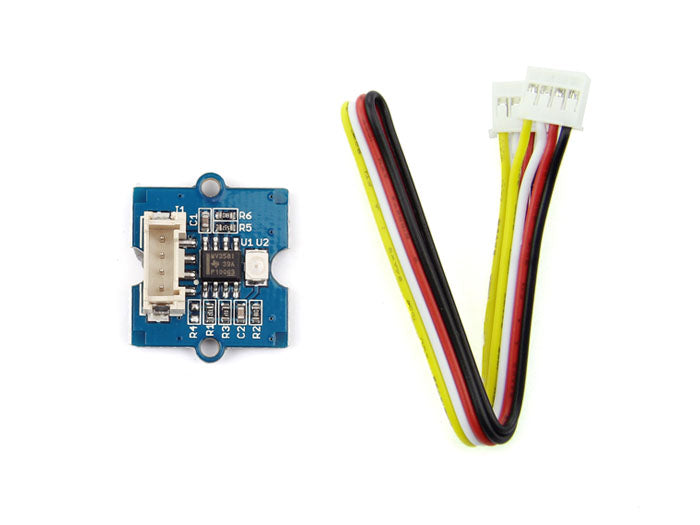UV Sensor Grove
UV Sensor Grove - UV Sensor Grove is used for detecting the intensity of incident ultraviolet(UV) radiation. This form of electromagnetic radiation has shorter wavelengths than visible radiation. It is based on the sensor GUVA-S12D.It has a wide spectral range of 200nm-400nm. The module will output electrical signal which is varied with the change of the UV intensity. UV sensors are used for determining exposure to ultraviolet radiation in laboratory or environmental settings.
Frequently Asked Questions about UV Sensor Grove
Q1: What is the UV Sensor Grove?
A portable and simple-to-use ultraviolet (UV) sensor module called the UV Sensor Grove was created to measure UV intensity. It is a component of the Grove system, a plug-and-play electrical prototyping platform that is modular. The UV Sensor Grove provides an analog output that can be easily connected to microcontrollers or other devices for UV-level detection.
Q2: What is the working method of the UV Sensor Grove used for?
UV light in the UVA and UVB spectrum can be detected in the UV Sensor Grove by a UV-sensitive photodiode. The ultraviolet (UV) radiation is transformed by the sensor into a flow of electricity and a signal that indicates voltage. When UV light is detected, the sensor module produces an analog voltage proportionate to its intensity.
Q3: What is the wavelength and accuracy range of the UV Sensor Grove?
The UV Sensor Grove can detect UV light in the UVA (315-400 nm) and UVB (280-315 nm) ranges. It can effectively measure UV radiation levels within this spectrum. The accuracy of the UV Sensor Grove depends on various factors such as the quality of the module, calibration, and environmental conditions. However, most UV Sensor Grove modules have a typical accuracy within ±1 UV Index unit.
Q4: What is the UV Index?
The UV Index is a defined metric for determining the UV radiation intensity from the sun. It provides a suggestion as to the potential harm that exposure to UV radiation may have. The UV Index scale ranges from 0 to 11+, with higher values indicating greater UV intensity and potential risk. The UV Sensor Grove can be calibrated to provide UV Index readings.
Q5: How do I connect the UV Sensor Grove to a microcontroller or other devices?
The UV Sensor Grove module comes with four pins: VCC, GND, SIG (signal), and NC (no connection). VCC and GND are used for power supply (typically 3.3V or 5V). SIG is the analog output pin that provides the UV intensity reading, which can be connected to an analog input pin on your microcontroller or other devices.
Q6: How can I calibrate the UV Sensor Grove?
Calibration of the UV Sensor Grove is essential to ensure accurate UV level measurements. Calibration involves comparing the sensor readings with a reliable UV indexes reference, such as a commercial UV index meter or an online UV index database. By adjusting the calibration parameters, you can align the sensor readings with the reference values.
Q7: What are some applications of the UV Sensor Grove?
The UV Sensor Grove finds applications in various fields, including:
- UV exposure monitoring: It can be used to measure UV levels in outdoor activities, helping users take appropriate precautions to prevent sunburn or skin damage.
- Smart agriculture: The sensor can be used to monitor UV radiation levels in greenhouses or crop fields, aiding in optimizing plant growth conditions.
- UV sterilization: It can be used to measure UV intensity in germicidal applications to ensure effective disinfection.
Features
- High stability
- Good Sensitivity
- Low power consumption
- Schottky type photodiode sensor
- Wide response range
- Grove Interface
UV Sensor Grove
UV Sensor Grove
Out of stock
Product Code
SKU:101020043
Couldn't load pickup availability


